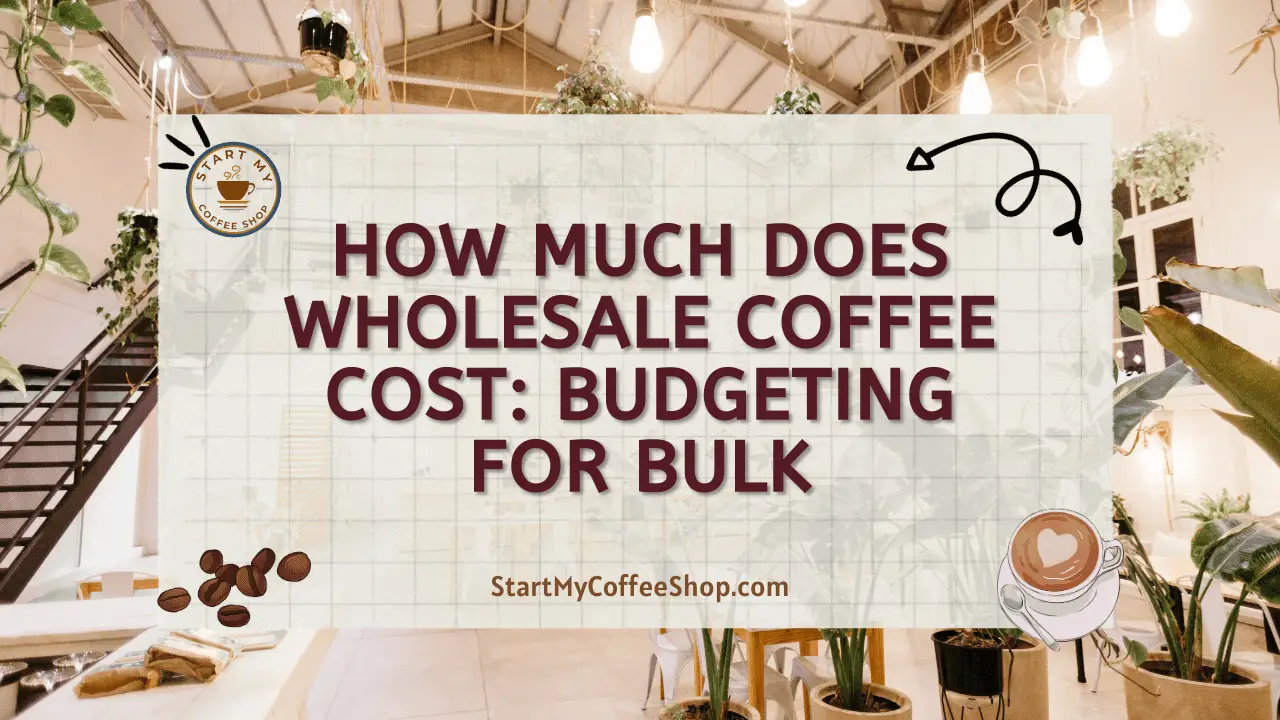Coffee is a beloved beverage enjoyed by millions of people around the world. If you’re a coffee business owner or a coffee enthusiast looking to purchase coffee in bulk, understanding the cost of wholesale coffee is crucial.
The average cost of wholesale coffee varies depending on factors such as bean quality, origin, and current market conditions. However, it typically ranges from $8 to $20 per pound.
In this article, I will explore the factors that influence wholesale coffee prices, and different pricing models, and provide you with insights to help you make informed decisions about purchasing coffee in bulk.
Factors Affecting Wholesale Coffee Prices:
Coffee Bean Quality

When it comes to the price of coffee beans, their quality takes center stage. The distinction between specialty-grade Arabica beans and commercial-grade Robusta beans greatly impacts their respective price points. Specialty-grade Arabica beans, sought after for their exquisite flavor profiles and distinct qualities, often command a higher price compared to Robusta beans. Several factors contribute to the overall quality of coffee beans.
For instance, the altitude at which the beans are grown affects their flavor development and complexity. The composition of the soil in which the coffee plants thrive also influences the beans’ characteristics. Additionally, the specific growing region imparts unique flavors and nuances to the beans.
Moreover, the processing methods employed, such as wet or dry processing, further contribute to the beans’ quality. All these factors work in harmony to determine the price of coffee beans, reflecting the care, expertise, and craftsmanship involved in their production.
Read more about: Cost to Run a Coffee Shop: Caffeine and Cash
Coffee Bean Origin
When it comes to wholesale coffee prices, the country of origin holds significant sway. Coffee-producing regions such as Colombia, Ethiopia, Brazil, and Guatemala have gained international recognition for their exceptional coffee cultivation practices and are known for producing beans with distinct flavor profiles.
The unique environmental conditions, including climate, soil composition, and altitude, in these regions contribute to the development of flavors that are highly sought after by coffee enthusiasts.
The rarity and demand for coffee beans from specific regions also play a role in determining their price. For example, the high-altitude Arabica beans grown in the mountainous regions of Colombia are revered for their rich, well-balanced flavors, commanding a premium price in the wholesale market. Similarly, the floral and fruity Ethiopian coffee beans are cherished for their vibrant acidity and unique complexity, making them highly valued by coffee connoisseurs.
Moreover, Brazil, as the largest coffee producer in the world, often offers a diverse range of coffee options at various price points due to its extensive production capabilities. Guatemala, on the other hand, is known for producing high-quality specialty coffees with distinct flavor profiles, contributing to their comparatively higher wholesale prices.
Harvest Season and Supply
The timing of coffee harvests, which typically occurs once or twice a year depending on the region, plays a significant role in wholesale coffee prices. Various factors such as weather conditions, pests, and political instability can cause fluctuations in the coffee supply, subsequently impacting its price.
In years with low crop yields, where adverse weather events like droughts or heavy rains occur, or when pests infest coffee plantations, the scarcity of coffee can drive up wholesale prices. The limited availability of beans creates a higher demand, pushing prices upwards as buyers compete for a smaller supply. Coffee farmers may also face increased production costs to mitigate the impact of these unfavorable conditions, which can further contribute to price increases.
Conversely, during years with surplus harvests or favorable growing conditions, the market experiences a larger supply of coffee. This abundance can lead to more competitive pricing as sellers have a greater quantity of beans to offer, potentially driving down wholesale prices. Buyers may have more options to choose from and negotiate better deals due to the increased availability.
Coffee buyers must stay informed about the annual coffee cycles in different regions and understand the potential impact of supply fluctuations on wholesale prices. By monitoring market conditions and adapting purchasing strategies accordingly, buyers can navigate the ever-changing landscape of wholesale coffee pricing.
Roasting and Processing
The level of roasting and processing involved in preparing coffee beans can have a significant impact on wholesale coffee costs. Various roasting profiles and processing methods, such as natural, washed, or honey processed, incur different expenses that may be reflected in the final price.
Roasting coffee beans requires specialized equipment, skilled labor, and energy consumption. The duration and temperature of the roasting process can vary, resulting in different flavor profiles and complexities.
Beans roasted to a lighter level may retain more of their inherent flavors and acidity, while darker roasts tend to have bolder and more pronounced flavors. The time, effort, and resources invested in achieving specific roasting profiles contribute to the overall cost of wholesale coffee.
Processing methods, such as the removal of the coffee cherry’s skin and pulp, also influence the final product. The more labor-intensive processing methods, such as the washed or honey-processed methods, require additional steps and careful monitoring. These extra efforts can add to the overall expenses of production, impacting the wholesale price of coffee.
Read more about: Cost to Open Up a Coffee Shop: The Financial Considerations
Pricing Models in Wholesale Coffee
Spot Pricing
Spot pricing is a purchasing model that involves buying coffee at the current market price. This pricing method is influenced by the ever-changing dynamics of supply and demand, which can result in price fluctuations over time.
Buyers who opt for spot pricing benefit from its inherent flexibility. They have the advantage of being able to adapt their purchasing decisions based on prevailing market conditions. If the market experiences a surplus of coffee, buyers may have the opportunity to secure more competitive prices. Conversely, during periods of high demand or limited supply, spot pricing may lead to higher prices.
However, it is important to note that spot pricing entails a level of market volatility. Prices can fluctuate rapidly in response to various factors, such as weather events, political developments, or economic conditions in coffee-producing regions.
Buyers who choose spot pricing should be prepared to navigate these price fluctuations and have the necessary flexibility and risk tolerance to adapt their purchasing strategies accordingly.
Fixed-Price Contracts
Fixed-price contracts offer a level of stability and predictability in the wholesale coffee market. With this model, buyers and sellers agree upon a set price for a specified period and enter into a contractual agreement. The agreed-upon price is typically based on current market trends and factors such as supply and demand dynamics.
One of the primary benefits of fixed-price contracts is the protection they provide against price increases. By establishing a predetermined price, buyers can mitigate the risk of sudden price spikes in the market. This stability allows businesses to plan their budget and manage costs more effectively, providing a sense of security.
However, it’s essential to note that fixed-price contracts may not take advantage of potential price decreases in the market. If coffee prices drop during the contract period, buyers are still obligated to purchase at the agreed-upon higher price. This aspect of fixed-price contracts means that buyers may miss out on potential cost savings if market prices decrease significantly.
Despite this limitation, fixed-price contracts offer peace of mind and financial security to buyers by providing a predictable cost structure. They are particularly beneficial for businesses that prioritize budget certainty and prefer a more conservative approach to managing price fluctuations in the wholesale coffee market.
Cost-Plus Pricing
Cost-plus pricing is a commonly used strategy in the wholesale coffee industry, where sellers determine the price by adding a markup to the production and distribution costs. This approach ensures that sellers can cover their expenses while also generating a profit. The specific markup percentage applied in cost-plus pricing can vary based on various factors.
One crucial factor is the operational costs incurred during the coffee production and distribution process. These costs include expenses such as farming, processing, packaging, transportation, and storage. Sellers need to factor in these costs to determine a reasonable markup percentage.
The desired profit margin is another factor that influences the markup. Sellers need to establish a profit goal that aligns with their business objectives and financial targets. This desired margin can differ based on the seller’s business strategy, market position, and long-term goals.
Lastly, market competition also plays a role in determining the markup percentage. Sellers need to consider the prevailing market prices and competitive landscape to ensure their pricing remains competitive while still covering costs and achieving the desired profit.
Read more about: Cost to Open Small Coffee Shop: Opening Costs Revealed
Finding Wholesale Coffee Suppliers
Direct Trade

Direct trade is a method of coffee sourcing that involves establishing direct relationships between coffee farmers and buyers, bypassing intermediaries. This approach fosters transparency, ensures fair prices for farmers, and enables access to high-quality coffee.
Direct trade relationships are built through various means, such as attending coffee trade shows, personally visiting coffee farms to meet farmers, or connecting with specialty coffee associations that facilitate direct connections between producers and buyers. By engaging in direct trade, buyers can gain a deeper understanding of the coffee’s origin, cultivation practices, and the social and environmental impact of the farm.
This direct connection also allows buyers to negotiate fair prices directly with the farmers, ensuring their hard work and dedication are recognized and rewarded. Additionally, direct trade encourages sustainable and ethical practices, supporting the economic development of coffee-producing communities and fostering long-term partnerships based on mutual respect and shared values.
Specialty Coffee Importers
Specialty coffee importers play a crucial role in the coffee industry, specializing in sourcing and importing high-quality coffees from diverse regions around the world. These importers have extensive networks and relationships with coffee farmers, enabling them to offer a wide selection of exceptional beans.
By working with specialty coffee importers, buyers gain access to unique and distinct coffees that may not be readily available through other channels. Importers also ensure quality control by carefully vetting the beans they source, conducting cupping evaluations, and maintaining rigorous standards.
Their expertise in the coffee industry allows them to provide valuable guidance and recommendations to buyers, helping them navigate the vast array of options and find the perfect coffees to meet their specific preferences and requirements.
Collaborating with specialty coffee importers guarantees that buyers receive top-notch beans that have been sourced with care and dedication, ensuring a remarkable coffee experience.
Coffee Brokers
Coffee brokers serve as vital intermediaries between buyers and sellers in the coffee industry. With their extensive knowledge and expertise, brokers play a crucial role in assisting buyers in sourcing coffee that meets their specific requirements. They possess a deep understanding of the coffee market, including current trends, pricing dynamics, and quality standards.
By leveraging their network and industry insights, brokers can help buyers navigate the complexities of purchasing coffee in bulk. They facilitate connections between buyers and sellers, ensuring a smooth transaction process.
Additionally, brokers can negotiate on behalf of buyers, leveraging their market knowledge and relationships to secure favorable prices and terms. The guidance and support provided by coffee brokers simplify the buying process, helping buyers make informed decisions and ensuring that they acquire the coffee that aligns with their needs and preferences.
Read more about:Cost to Open Coffee Shop: Breaking Down the Bucks
Summary
Understanding the cost of wholesale coffee is essential for coffee business owners and enthusiasts alike. Buyers can make informed decisions and ensure a steady supply of high-quality coffee by exploring different pricing models and connecting with reputable suppliers.
Whether you’re starting a coffee shop or simply enjoying a fresh brew at home, being knowledgeable about wholesale coffee prices empowers you to find the perfect blend that suits your taste and budget.
Frequently Asked Questions
How can I find reliable wholesale coffee suppliers?
You can find reliable wholesale coffee suppliers by attending coffee trade shows, networking with specialty coffee associations, or working with reputable coffee importers and brokers who have established relationships with coffee farmers.
What are the main factors that influence wholesale coffee prices?
Wholesale coffee prices are influenced by factors such as the quality of the beans, the country of origin, harvest season and supply fluctuations, and the roasting and processing methods used.
What are the different pricing models for wholesale coffee?
The different pricing models for wholesale coffee include spot pricing, fixed-price contracts, and cost-plus pricing.
To learn more on how to start your own coffee shop, check out my startup documents here.
Disclaimer: The information provided by StartMyCoffeeShop.com (“The Site”) is for general informational purposes only. All information on the Site is provided in good faith. However, we make no representation or warranty of any kind, express or implied, regarding the accuracy, adequacy, validity, reliability, availability, or completeness of any information on the Site. Under no circumstance shall we have any liability to you for any loss or damage of any kind incurred as a result of the use of the Site or Reliance on any information provided on the Site. Your use of the Site and reliance on any information on the Site is solely at your own risk. This blog post is for educational purposes only and does not constitute legal advice. Please consult a legal expert to address your specific needs. Terms and Conditions. (https://startmycoffeeshop.com/terms-and-conditions/)

Hi! I’m Shawn Chun
My adventure in coffee began when I first launched my first coffee shop back in the early 2000s. I had to figure out so many things on my own and to make it worse within 2 years of opening two large corporate coffee chains moved in just blocks away from me!
As I saw smaller and even some larger coffee shops in the neighborhood slowly lose customers to these giant coffee chains and slowly close up shop, I knew that I had to start getting creative…or go out of business.
I (like you may be) knew the coffee industry well. I could make the best latte art around and the foam on my caps was the fluffiest you have ever seen. I even had the best state-of-the-art 2 group digital Nuova Simonelli machine money could buy. But I knew that these things alone would not be enough to lure customers away from the name brand established coffee shops.
Eventually, through lots of trial and error as well as perseverance and creativity I did find a way to not only survive but also thrive in the coffee/espresso industry even while those corporate coffee chains stayed put. During those years I learned to adapt and always faced new challenges. It was not always easy, however, in the end, I was the sole survivor independent coffee shop within a 10-mile radius of my location. Just two corporate coffee chains and I were left after that year. All told the corporate coffee chains took down over 15 small independent coffee shops and kiosks and I was the last one standing and thriving.
Along the years I meet others with the same passion for coffee and I quickly learned that it is not only “how good a barista is” that makes a coffee shop successful, but the business side of coffee as well.
Hence why I started this website you are on now. To provide the tools and resources for up and coming coffee shop owners to gain that vital insight and knowledge on how to start a coffee shop successfully.
Stick around, browse through my helpful blog and resources and enjoy your stay! With lots of LATTE LOVE!
Shawn






